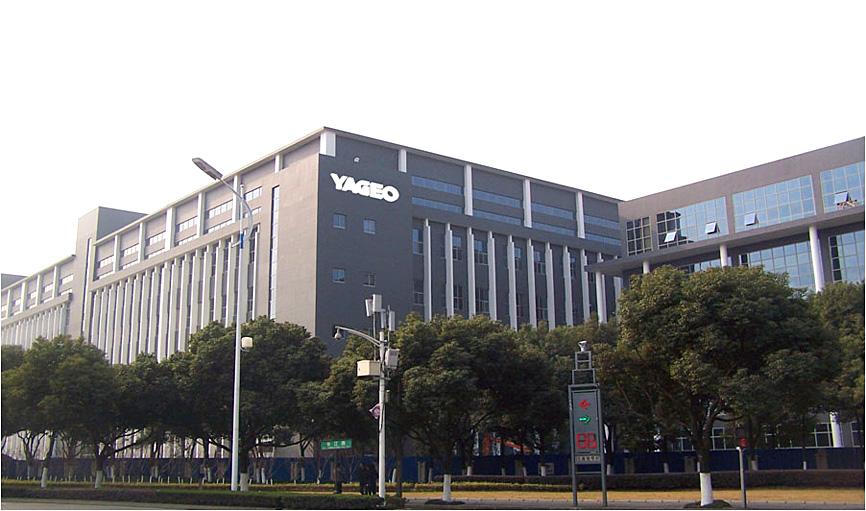Yageo Corp (國巨) yesterday said that its revenue would drop by a low single-digit percentage this quarter from a historical high last quarter, as customers and distributors are holding back demand to concentrate on inventory digestion due to flagging smartphone and notebook computer demand.
The world’s biggest supplier of passive components expects to take three to six months to reduce its inventory of commoditized passive components to a normal level of 100 to 110 days, from 130 days currently.
Yageo would reduce its factory utilization rate for standard passive components to about 60 percent this quarter, from about 70 percent last quarter, to reach its inventory goal by the end of this year or in the first quarter of next year, it said.

Photo: Chang Hui-wen, Taipei Times
Passive components such as resistors, capacitors and inductors are integral parts of a motherboard.
“The second half of the year should continue to be challenging. The inventory situation has not really improved. The standard segment continues to weigh on operations,” Yageo chief financial officer Eddie Chen (陳彥松) told investors. “The book-to-bill ratio for premium products stands at about one, but below one for standard products”
On the bright side, Yageo still sees solid demand for premium passive components used in automotive, industrial and networking devices, leading to high utilization of those product lines at 90 to 100 percent, Chen said.
Those premium passive components accounted for 75 percent of Yageo’s revenue last quarter.
Gross margin would this quarter slide to a level similar to the first quarter at 38.1 percent, compared with 38.8 percent in the April-to-June period, Chen said.
Operating profit margin would also be similar to the first quarter at 24.8 percent, a slight decline from 25.2 percent last quarter, he said.
Yageo attributed the stable margins to its persistent efforts to broaden its product portfolio over the past few quarters.
Thanks to its diverse offering, Yageo should be able to “resist” the pricing pressure in the second half of this year when the market is expected to slow, Chen said.
The company said it would keep its capital expenditure budget for this year unchanged at NT$10 billion to NT$11 billion (US$334 billion to US$367.4 billion), as it believes the industry is still on track to grow in the long term.
Yageo reported NT$5.93 billion in net profit for the quarter ending June 30, surpassing its share capital of NT$5.44 billion. That represented an annual decline of 6.4 percent from NT$6.33 billion and a quarterly drop of 5.1 percent from NT$5.24 billion.
Earnings per share fell to NT$11.05 last quarter from NT$12.82 percent in the second quarter of last year and down from NT$11.59 in the first quarter of this year.
The company had to pay a higher income tax bill due to undistributed earnings of about NT$600 million last year, which led to a NT$1 drop in earnings per share last quarter, it said.
Gross margin and operating profit margin improved on a quarterly basis, thanks to a better product mix and greater revenue scale, it said.
Revenue expanded 13 percent year-on-year and 3.9 percent quarter-on-quarter to NT$31.32 billion last quarter, a new record.

NEW IDENTITY: Known for its software, India has expanded into hardware, with its semiconductor industry growing from US$38bn in 2023 to US$45bn to US$50bn India on Saturday inaugurated its first semiconductor assembly and test facility, a milestone in the government’s push to reduce dependence on foreign chipmakers and stake a claim in a sector dominated by China. Indian Prime Minister Narendra Modi opened US firm Micron Technology Inc’s semiconductor assembly, test and packaging unit in his home state of Gujarat, hailing the “dawn of a new era” for India’s technology ambitions. “When young Indians look back in the future, they will see this decade as the turning point in our tech future,” Modi told the event, which was broadcast on his YouTube channel. The plant would convert

‘SEISMIC SHIFT’: The researcher forecast there would be about 1.1 billion mobile shipments this year, down from 1.26 billion the prior year and erasing years of gains The global smartphone market is expected to contract 12.9 percent this year due to the unprecedented memorychip shortage, marking “a crisis like no other,” researcher International Data Corp (IDC) said. The new forecast, a dramatic revision down from earlier estimates, gives the latest accounting of the ongoing memory crunch that is affecting every corner of the electronics industry. The demand for advanced memory to power artificial intelligence (AI) tasks has drained global supply until well into next year and jeopardizes the business model of many smartphone makers. IDC forecast about 1.1 billion mobile shipments this year, down from 1.26 billion the prior

People stand in a Pokemon store in Tokyo on Thursday. One of the world highest-grossing franchises is celebrated its 30th anniversary yesterday.

Zimbabwe’s ban on raw lithium exports is forcing Chinese miners to rethink their strategy, speeding up plans to process the metal locally instead of shipping it to China’s vast rechargeable battery industry. The country is Africa’s largest lithium producer and has one of the world’s largest reserves, according to the US Geological Survey (USGS). Zimbabwe already banned the export of lithium ore in 2022 and last year announced it would halt exports of lithium concentrates from January next year. However, on Wednesday it imposed the ban with immediate effect, leaving unclear what the lithium mining sector would do in the